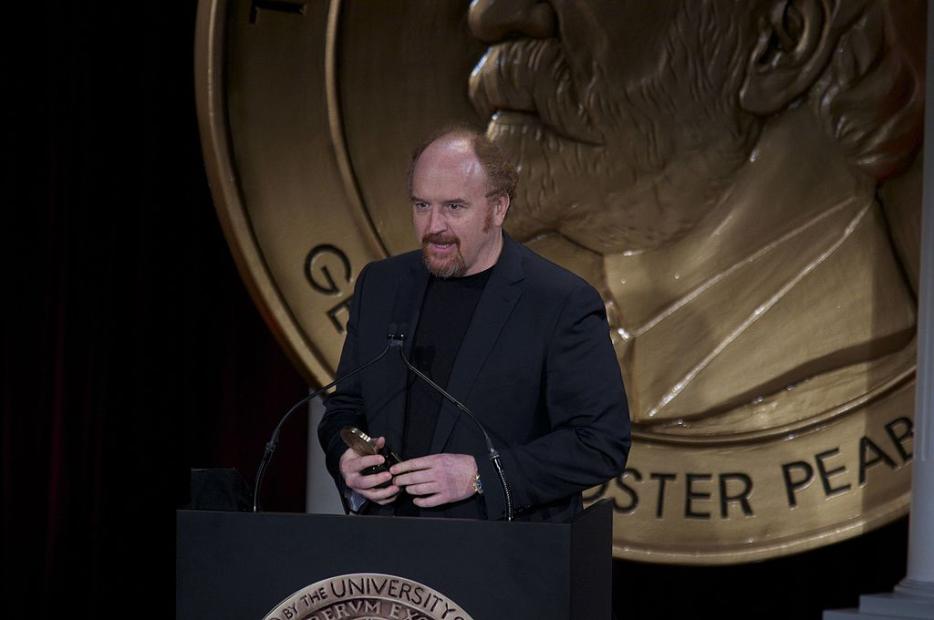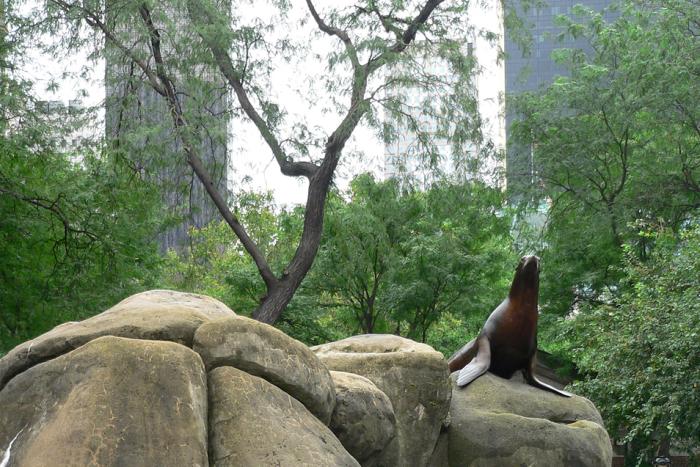In the fourth season of Louie, the title character assaults his friend. It happens in an episode called “Pamela (part 1).” Louie’s friend (played wonderfully by Pamela Adlon) spends the evening babysitting his kids while he’s out doing a comedy gig; after, when he walks into his apartment, she’s asleep on the couch. While he’s standing there staring at her, she groggily mumbles, “Please don’t start jerking off, I’m awake.” He offers her money for the babysitting, she declines. Then, as she’s walking towards the door, he moves to kiss her. She ducks away. He grabs her arm. She tries to leave. He holds her arm. She says goodbye, and she says no, and he won’t let go of her—and all of a sudden he’s dragging her across the apartment, struggling with her as she tries to get away. At one point, she pulls a dresser across the room in an attempt to slow him down. At another, she grips the edges of a doorframe. After he tries to tug her shirt off, but before he corners her in a doorway and forces her to kiss him, she claps her hand over his mouth and shoves him away. “This would be rape if you weren’t so stupid!” she screams. “God! You can’t even rape well.”
The first time I watched this scene, I was alone in a hotel room. A hot flush crept up my neck; I paused the scene after that line so I could get up and open a window. Then I sat there with the mouse hovering over the play button, trying to decide if I wanted to start it again. I did. When the scene was finished, I watched it again; then I started the episode over.
Louie’s fourth season is about the ways men threaten and harm women without really thinking about it. In its first episode, creator and comedian Louis C.K.’s protagonist breaks a woman’s nose—but in the familiar style of the show, it’s all a zany misunderstanding. Over the course of the season, though, something in Louie’s familiar, bumbling, likeable persona starts to sour—or maybe it’s always been that way, and we’re just finally getting to see it. In the season’s longest storyline, he tries to push a relationship with a woman who doesn’t speak English, coerces her into sex, and then beats the shit out of a piano with a baseball bat when he thinks she’s rejected him.
All of this meant something to me. I had always liked Louie, but the way C.K. positioned his protagonist as ultimately likeable no matter what had kept me at a distance. What was happening in the show now, though, felt interesting and true. The scene with Pamela made me feel a queasy mixture of comfort and fear I couldn’t reconcile, no matter how many times I watched it over. I couldn’t stop thinking about how closely it resembled a drunken struggle I’d had in my own apartment with an ex-boyfriend a couple years earlier. The edges of that memory were blurry; I’d barely ever talked about it with anyone. But the way this scene played out—the stumbling awkwardness, the danger and absurdity—looked a lot like the way I remembered my own experience. Each time I watched it, the memory played splitscreen in my mind.
This, I guess, is the terrifying magic of art: a stranger makes something because it means something to them, and then skips it across time and space to fuck up a little corner of your life. I went back to watch the episode before I wrote this piece, and it turns out this stuff doesn’t go away; it stirred up exactly the same overwhelming emotional reaction in me as it did the first time I watched it. The uncanny, unsteady wonder of feeling joined somewhere you used to think you were alone.
*
Last week, an interviewer asked Tig Notaro about Louis C.K.’s producer credit on her series One Mississippi. “It’s frustrating, because he has nothing to do with the show,” she said. Later, she asked the interviewer whether C.K. had ever addressed the rumours of sexual misconduct first levelled against him by Gawker in 2012. “I think it’s important to take care of that, to handle that, because it’s serious to be assaulted,” she said. “It’s serious to be harassed. It’s serious, it’s serious, it’s serious.”
The allegations she’s referring to are vague (Notaro herself said she hasn’t spoken to C.K. in a year and a half due to “an incident”), but about once every year or so, they resurface. The Daily Beast does a good job of summarizing them, but in a nutshell, there were two Gawker posts (a blind item in 2012 and one that named him in 2015) that claimed C.K. had a history of harassing and assaulting women, most notably by masturbating in front of them without their consent. In 2015, on her podcast, the comedian Jen Kirkman talked about her experiences with someone who was almost certainly C.K., calling him a “known perv” who “didn’t rape me, but he made a certain difficult decision to go on tour with him really hard.” She quickly deleted it, later saying that she had put the whole thing behind her. (Roseanne Barr also brought up the rumours in an interview last summer, but said she didn’t have any firsthand knowledge.)
Depending on how you want to look at all this, it’s not much, or it’s not nothing. As it stands, there is no way for anyone except C.K. and the people who made these allegations in the first place to know what’s going on. If you are inclined to believe the rumours, then the lack of concrete evidence to support them does not make them seem any less possible—it just looks like proof that C.K. is very famous. There’s no shortage of precedent for situations where a scattered number of persistent rumours about a famous man’s sexual misconduct turned out to be true. People with power silence people with less of it all the time.
Conversely, if you don’t believe the rumours—or if you don’t want to—there’s no real concrete proof to convince you that you should. There are few details and no names, no police records, no legal documents, no tidal wave of public confessions. Just some off-the-record whispers from anonymous sources whose motivations for casting doubt on C.K.’s character could be anything at all.
C.K. himself has only ever addressed the whole thing once, back in a 2016 interview with Vulture. In the middle of a conversation about why he hates the Internet, David Marchese asked if the comedian’s distaste had anything to do with the Gawker items. C.K. replied: “I don’t care about that. That’s nothing to me. That’s not real.”
When pressed, he went on:
Well, you can’t touch stuff like that. There’s one more thing I want to say about this, and it’s important: If you need your public profile to be all positive, you’re sick in the head. I do the work I do, and what happens next I can’t look after. So my thing is that I try to speak to the work whenever I can. Just to the work and not to my life.
Again, the way this looks depends on what you want to see. If you think the Gawker posts were unsubstantiated rumours so baseless they’re not even worth addressing, C.K.’s refusal to talk about them is a smart way of handling a potentially explosive issue. If you think they might be true, it’s just a dodge. And if you just don’t want to think about it at all, then great, because neither does he.
Whatever the truth is, there’s no denying that this is a good way to handle a toxic rumour. If you refuse to discuss something that no one really wants to think about anyway, everyone forgets about it pretty quick. And as long as they stay unspecific, sporadic and spread out, allegations like this don’t have to trouble a man’s career at all.
So it makes sense that C.K. wouldn’t want to talk about them in public. As the situation currently stands, he doesn’t really have to. The first Gawker post to explicitly name him was published in May of 2015, and it didn’t slow the steady clip of his work: since then he’s released a new standup special, put out Louie’s final season, made the webseries Horace and Pete, acted as executive producer on several other TV shows (including Notaro’s), and even voiced a character in The Secret Life of Pets. Most recently, it was announced that he’ll be premiering a short film called I Love You, Daddy (parenting is one of C.K.’s favourite sources of material) at this year’s TIFF. People are looking forward to it.
But something doesn’t sit right about his refusal to discuss the allegations. In that same Vulture interview in which he dismissed them, for example, he spent two and a half paragraphs chatting animatedly about how quitting the Internet has changed his (solo) masturbation habits for the better. Even if you believe the claim that he tries to speak just to the work and not his life, it’s impossible to deny that C.K.’s brand is built around the casual ease with which he blurs the line between the two, both in his work and in the public conversation that surrounds it.
His insistence that none of this matters has kept the subject from troubling his public image not because this work/life argument is ironclad, but because most of the people who admire his work really don’t want to think about the rumours at all. If you’re a Louis C.K. fan, his reasoning is attractive for the same reason it’s logically dubious—because an essential part of his act is the assumption that it’s scaffolded by a moral conscience. If the structural integrity of the whole thing starts to give way, then suddenly your favourite comedian might not be your favourite comedian anymore. If these rumours were true, they would suck the life out of a lot of his best jokes, because their humour depends on the idea that they don’t end with a crime. A bit about how men are the number one threat to women doesn’t land quite the same way if the man doing it is guilty of sexual assault. It’s both easier for C.K. and better for his brand if he just keeps his mouth shut.
But these rumours haven’t gone away. They’ve been floating around publicly for five years now, and regardless of whether or not he wants to address them, they’re past the point where C.K. can comfortably argue they don’t matter, or that they’re not real. Notaro’s right: it’s serious to be harassed, it’s serious to be assaulted. And even though C.K.’s career could continue mostly unaffected if he never addressed these allegations head-on, his refusal to treat the subject as if it deserves to be addressed feels unpleasantly dismissive to the people who think the question does matter. Whenever these rumours slip back into the pop-cultural news cycle, the women I know who like C.K.’s work invariably say the same things: it’s depressing, it’s disappointing, it feels like a betrayal.
*
A lot of C.K.’s jokes are about digging into popular consensus until he hits the absurdity at its core. He’s good at seeing blind spots, pointing out acute moments of hypocrisy or misunderstanding that are symptomatic of bigger cultural issues, moments of willful blindness that get woven into the everyday. Privilege is a big part of his act. In recent years, misogyny’s become another.
In the middle of “Pamela (Pt. 1),” Louie does a long standup bit. In it, he talks about how there are people in his apartment building older than women’s suffrage. He talks about how we’re still so comfortable with the idea of wives being their husbands’ property that there’s a kind of shirt named after beating them up. Then he goes home and assaults his friend.
There’s no shortage of movies and TV shows that use rape as a plot point, or to draw up cheap tension, or to manipulate their audiences into hating a character. But you don’t see a lot of pop culture made by straight white men for straight white men that really goes headfirst into the mess of it. By the time Louie was in its fourth season, its protagonist had a lot of audience goodwill to burn, and C.K. seemed to want to do something legitimately complicated with it: to show exactly how a man who’s a loving father and a popular comedian and an ostensible feminist—a man you like so much you literally invite him into your house once a week—can also be a man who coerces women into sex and corners them when they say no and beats inanimate objects with a baseball bat when he doesn’t get his way.
One of the most persistent and damaging cultural myths about sexual assault is that the people who commit it are uniquely evil—that they are not the same as the people you are friends with, or related to, or dating, or a fan of, the people that you trust or that you like. This is the same lie that says rape and assault and harassment only happen to a few people some of the time for a very particular set of reasons, and that if you think those things have ever happened to you, they should be easy to identify, fact-check and prosecute—otherwise, maybe they didn’t at all.
This lie is threaded through so much of our popular culture that it seems impossible to name all the different kinds of damage it does. It makes it hard for victims to clearly process harm and trauma, and it makes it hard for perpetrators to understand exactly what they’ve done or how they might change. It keeps white, cisgender people comfortable ignoring the humanity of women of colour and trans women and Indigenous women and sex workers. It turns conversations into minefields and sex into a whole big dumb thing and the Internet into a toxic swamp of boiling shit where clicking on the wrong link scalds your soul. It makes it easy for people to comfortably ignore the suffering of others, which means that it stunts our collective cultural capacity for empathy.
I’m not telling you anything you don’t already know. People say this kind of stuff a lot, in these kinds of broad, sweeping terms, whenever a big-news sexual assault scandal becomes a lightning rod for public comment. And those are pretty much the only times I see the people in my life who fit most neatly into C.K.’s target demographic—usually straight white men, always people who think of themselves as intelligent and moral—actively participate in difficult, uncomfortable conversations with each other about what the lie looks like and how it works.
And it’s not enough! Not because you have to fulfill some depressing-thoughts quota before you get your Good Guy badge, but because if you only think about how complicated the issue of sexual assault is once a news story gets horrifically unequivocal, you are far too late. This is not about trying celebrities in the “court of public opinion” everyone’s so scared of—it’s just about giving a shit about things that might bother other people, even if they do not really bother you. If you only think really hard about the pervasiveness and complexity of sexual assault when it’s time to do triage on your tastes or perform some easy outrage on the Internet, then you will not be adequately prepared to understand how our culture’s myriad lies about it affect you and the people around you on a day-to-day basis when they come up in smaller, less straightforward ways, which is how they almost always do. You will absolutely not be ready to create any meaningful change in your own thoughts, attitudes or actions. And most of all, you will not be of any practical use to the people around you who have no choice but to carry this discomfort around with them all the time, the people whose lives these lies facet and fuck up daily. It’s a privilege to be untroubled, to stay that way.
This is why C.K.’s failure to address these allegations is not a good enough reason for his fans to avoid the difficult, uncomfortable issues they bring up. If you like this guy’s work because of its ethical spine, and yet you can keep enjoying it exactly the same way once these allegations are introduced—without any traces of concern or creeping dread or cognitive dissonance or confusion or frustration—then maybe it’s worth thinking about why they’re so easy for you to ignore. This is the exact same idea that runs under C.K.’s work like a third rail, makes him seem so insightful: the moments when an issue is small enough for you to register it and then turn away comfortably are the moments when it probably deserves your closest scrutiny.
This is why I find the situation with C.K. so uniquely disappointing, why it feels more like betrayal than plain bad news. It is exhausting to live in a world where no one wants to call things what they are. My life is buffered by such incredible privilege that I only ever have to feel a fraction of the full weight of this problem—and still, sometimes, I feel like it might crush me. On good days, I can read a news story about some famous guy not wanting to talk about whether he sexually assaulted anyone, and it just feels like another depressing, ambiguous story to throw on the pile. But more often, it makes me think about the enormous difference between the way I know the world works and the way popular culture pretends it does. It makes me think about the guy who grabbed my wrists in my apartment, and the friend who pulled my hair outside the party, and the one-night stand I had with a guy who turned out to have assaulted a literal dozen of my friends, and all the dates I ever cut out of early because I felt unsafe, and all the inoffensive ways I know to say no thank you, and all the heterosexual men who have worked their way into my life by disguising their intelligence as moral character and then disappointed me by not actually giving a shit about anyone except themselves. It makes me think about all the people I have trusted and it makes me wonder why, and then it makes me feel like an idiot chump whose only options are to spend her life trying to win a rigged game or to opt out of playing entirely. It puts distance between me and the world. It fucking sucks.
Art lifts this weight a little. Pop culture can make people change their minds. While a million different kinds of people can make complex and beautiful work about the space assault and harassment and rape takes up in their lives, it still seems unique and surprising and hopeful when a Louis C.K. makes a TV show or a joke about those same things. The unfortunate truth is that straight white men talking to other straight white men honestly about how pervasive and complex these issues are—about what they look like and how they work—is the only way for popular attitudes about them to really change.
C.K.’s work once mattered to me because it seemed not just funny but important; or, I guess, both at the same time. Now, it makes me feel like I got tricked by another man who’s only willing to engage with this stuff at arms’ length, and only for as long as it makes him look good. If you care about this problem enough to make art about it, it doesn’t magically stop mattering once it touches your real life. If it’s serious enough to joke about, then it’s serious. Full stop.






